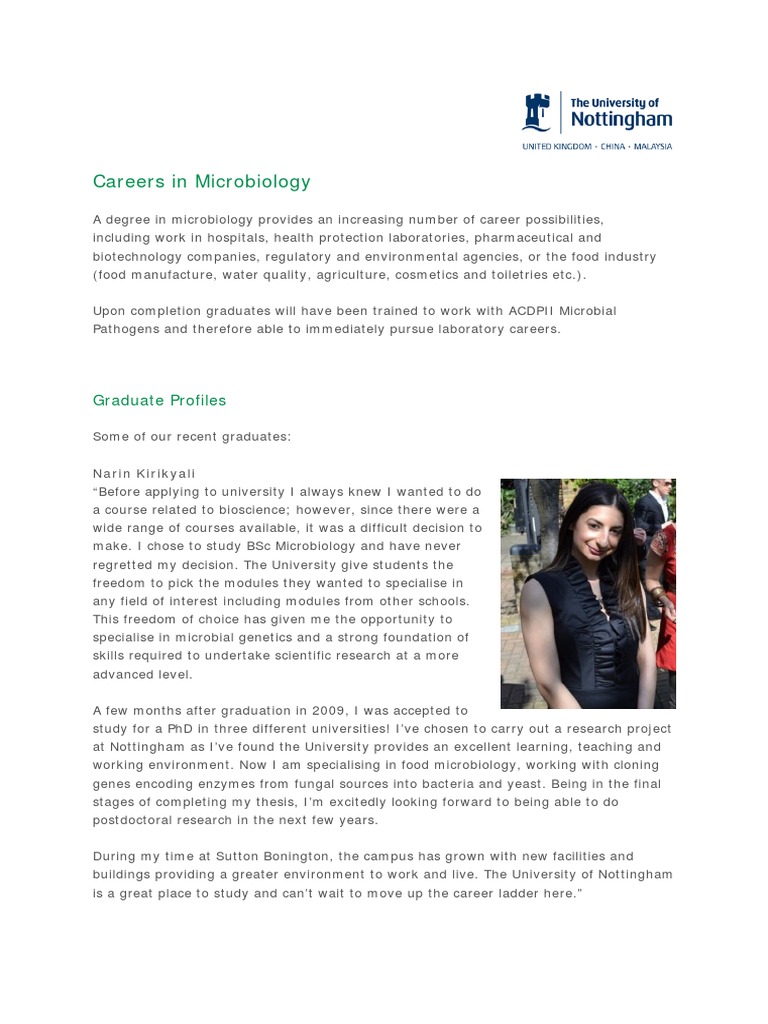Careers With A Microbiology Degree

Microbiology, the study of microorganisms, is a fascinating field that delves into the intricate world of bacteria, viruses, fungi, and other microscopic entities. A degree in microbiology opens doors to a wide range of careers, offering opportunities to make a significant impact in healthcare, research, environmental science, and beyond. This article explores the diverse career paths available to microbiology graduates, highlighting the skills, knowledge, and opportunities that await those with a passion for the microscopic realm.
The Allure of Microbiology Careers

Microbiology, often considered a branch of life sciences, is an interdisciplinary field that combines elements of biology, chemistry, and physics. It offers a unique perspective on the world, allowing professionals to explore the invisible forces that shape our environment and impact our health. With a microbiology degree, individuals can pursue careers that range from laboratory research to healthcare, environmental monitoring, and even industrial applications.
Career Paths for Microbiology Graduates

The versatility of a microbiology degree is evident in the multitude of career options it presents. Here, we delve into some of the most prominent and rewarding paths for microbiology graduates.
Healthcare and Clinical Microbiology
One of the most well-known career paths for microbiology graduates is in healthcare and clinical settings. Clinical microbiologists play a crucial role in diagnosing and treating infectious diseases. They work in hospitals, clinics, and public health laboratories, where they identify pathogens, perform culture and sensitivity tests, and develop strategies to control the spread of infections.
The rise of antibiotic resistance has made the work of clinical microbiologists even more critical. By studying the genetic makeup of microorganisms, they can help develop new antibiotics and treatments, ensuring that healthcare professionals have the tools to combat emerging diseases.
Additionally, microbiology graduates can specialize in areas such as immunology, virology, or parasitology, further expanding their expertise in specific fields of healthcare.
| Specialization | Focus |
|---|---|
| Immunology | Study of the immune system and its response to pathogens |
| Virology | Focus on viruses and their impact on human health |
| Parasitology | Understanding parasites and their interaction with hosts |

Research and Academia
For those with a passion for discovery and a desire to push the boundaries of knowledge, research and academia offer a fulfilling career path. Microbiology researchers explore the fundamental aspects of microorganisms, contributing to our understanding of life at a cellular and molecular level.
Research in microbiology covers a wide range of topics, including microbial genetics, evolution, and the role of microorganisms in various ecosystems. It involves designing experiments, analyzing data, and publishing findings in scientific journals. Researchers often collaborate with experts from diverse fields, such as genomics, bioinformatics, and ecology, to tackle complex research questions.
Academia also provides opportunities to teach and mentor the next generation of microbiologists. As professors or lecturers, microbiology graduates can inspire and guide students, sharing their knowledge and fostering a love for the subject.
Environmental Microbiology
Environmental microbiology focuses on the role of microorganisms in natural environments and their impact on ecosystems. This field is crucial for understanding and addressing environmental challenges such as pollution, climate change, and biodiversity loss.
Environmental microbiologists study microbial communities in soil, water, and air, analyzing their composition, function, and interactions. They play a vital role in developing strategies for environmental remediation, monitoring the health of ecosystems, and assessing the impact of human activities on microbial populations.
For instance, in the context of climate change, environmental microbiologists study how microbial communities respond to rising temperatures and changing precipitation patterns. Their research helps us understand the potential consequences of climate change on ecosystems and informs efforts to mitigate its effects.
Food and Beverage Industry
The food and beverage industry relies heavily on microbiology to ensure the safety and quality of its products. Microbiology graduates can find rewarding careers in this sector, working to prevent foodborne illnesses and maintain high standards of hygiene.
Quality control specialists in food manufacturing companies utilize their knowledge of microbiology to develop and implement testing protocols. They analyze food samples for the presence of pathogens, spoilage microorganisms, and other contaminants, ensuring that products are safe for consumption.
Additionally, microbiology graduates can work in research and development, exploring new preservation techniques, studying the behavior of microorganisms in different food matrices, and contributing to the development of innovative food products.
Pharmaceutical and Biotechnology
The pharmaceutical and biotechnology sectors offer exciting opportunities for microbiology graduates. These industries rely on the unique properties of microorganisms to develop new drugs, vaccines, and biotechnological processes.
In pharmaceutical research, microbiologists play a crucial role in the development of antibiotics, antivirals, and other medications. They study the mechanisms of action of these drugs, test their efficacy, and contribute to the overall drug discovery process.
Biotechnology, on the other hand, harnesses the power of microorganisms for a wide range of applications. Microbiology graduates can work in areas such as biofuel production, enzyme development, and the creation of novel materials, using microorganisms as biological factories.
Water Quality Management
Water quality management is a critical aspect of public health and environmental sustainability. Microbiology graduates can contribute to this field by ensuring the safety and purity of water sources.
Water quality specialists analyze water samples for the presence of bacteria, viruses, and other pathogens. They monitor water treatment processes, ensuring that disinfection techniques are effective and that water meets regulatory standards.
Additionally, microbiology graduates can work in research, studying the impact of different water treatment methods on microbial communities and developing innovative approaches to water purification and sanitation.
Skills and Competencies for Microbiology Careers
A successful career in microbiology requires a unique set of skills and competencies. Here are some key attributes that microbiology graduates should possess or develop to excel in their chosen field.
- Scientific Inquiry and Critical Thinking: Microbiology demands a scientific mindset and the ability to approach problems with a critical eye. Graduates should be adept at designing experiments, analyzing data, and drawing meaningful conclusions.
- Laboratory Proficiency: Laboratory skills are fundamental in microbiology. Graduates should be comfortable with various laboratory techniques, instrumentation, and safety protocols.
- Attention to Detail: Microorganisms are often studied at the microscopic level, requiring a high degree of precision and attention to detail.
- Communication Skills: Effective communication is essential for conveying complex scientific concepts to both scientific and non-scientific audiences.
- Teamwork and Collaboration: Many microbiology careers involve working as part of a team, whether in a laboratory setting or as part of a research consortium. The ability to collaborate and contribute to a collective effort is crucial.
- Adaptability: The field of microbiology is dynamic, with new discoveries and technologies constantly emerging. Graduates should be adaptable and willing to learn new techniques and approaches.
The Future of Microbiology Careers
The future of microbiology careers is promising, driven by advancements in technology and an increasing awareness of the role of microorganisms in various aspects of life. Here are some emerging trends and opportunities that microbiology graduates can look forward to.
Precision Microbiology
Precision microbiology, also known as personalized microbiology, is an emerging field that aims to tailor healthcare and treatments to individual patients based on their unique microbial profiles. This approach has the potential to revolutionize the way we diagnose and treat diseases, especially in the context of personalized medicine.
Microbiome Research
The human microbiome, the collection of microorganisms that reside in and on our bodies, is a hot topic in medical research. Microbiology graduates can contribute to this field by studying the role of the microbiome in health and disease, developing probiotics and prebiotics, and exploring the potential of microbiome-based therapies.
Industrial Microbiology
Industrial microbiology involves the use of microorganisms for various industrial applications, such as fermentation, enzyme production, and bioremediation. With the increasing focus on sustainability and green technologies, industrial microbiology offers exciting opportunities for those interested in applying their knowledge to real-world problems.
Global Health and Infectious Diseases
Microbiology graduates can make a significant impact in global health by working to prevent and control infectious diseases. With the ongoing threat of pandemics and the emergence of new pathogens, the need for experts in infectious disease control and prevention is greater than ever.
Conclusion: A World of Opportunities

A degree in microbiology opens up a vast and diverse landscape of career opportunities. From healthcare and research to environmental science and industry, microbiology graduates have the knowledge and skills to make a difference in a wide range of fields. The unique perspective offered by microbiology allows professionals to explore the microscopic world and its impact on our lives, contributing to advancements in health, sustainability, and innovation.
Whether it's diagnosing diseases, developing new treatments, studying the environment, or shaping industrial processes, microbiology careers offer a rewarding and impactful journey. With a microbiology degree, the possibilities are as diverse as the microorganisms themselves.
What are the key skills needed for a career in microbiology?
+Microbiology careers require a strong foundation in scientific inquiry, critical thinking, and laboratory skills. Attention to detail, communication skills, and teamwork are also essential. Adaptability and a willingness to learn new techniques are highly valued in this dynamic field.
How can microbiology graduates contribute to global health efforts?
+Microbiology graduates play a crucial role in global health by working in clinical settings, conducting research on infectious diseases, and developing strategies to control and prevent the spread of pathogens. Their expertise is vital in addressing emerging diseases and pandemics.
What are some emerging trends in microbiology careers?
+Emerging trends include precision microbiology, microbiome research, and industrial microbiology. These fields offer exciting opportunities for microbiology graduates to contribute to personalized medicine, explore the role of the microbiome in health, and apply their knowledge to sustainable industrial processes.



